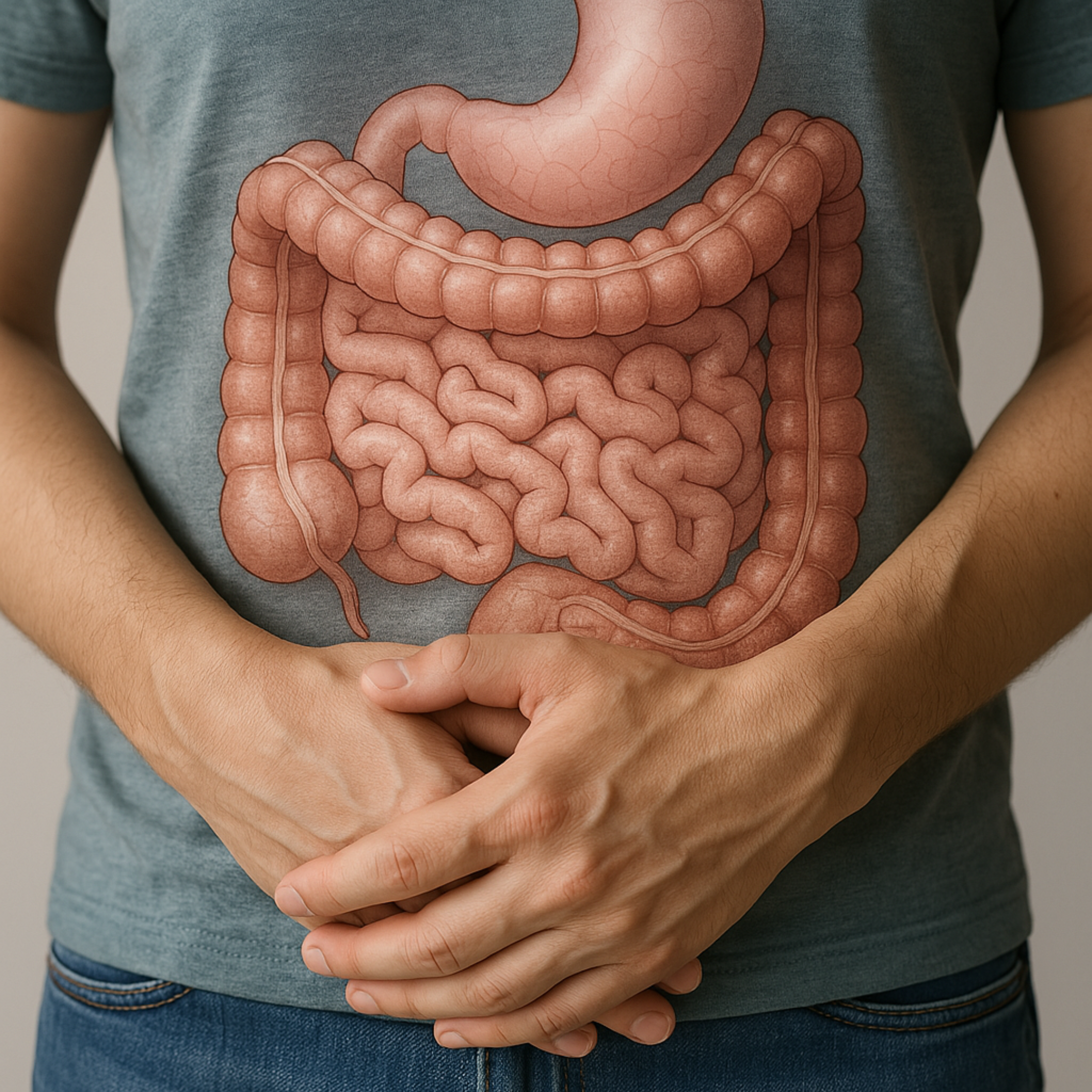Why Your IBS Diagnosis Might Be Letting You Down - With Dr James Kinross

Why Your IBS Diagnosis Might Be Letting You Down - With Dr James Kinross
It’s thought that around 20% of the UK population experience IBS. However, being diagnosed with IBS can often raise more questions than answers, leaving people in the dark when handling their condition.
If you’ve been diagnosed with Irritable Bowel Syndrome (IBS), you’re likely familiar with that frustrating feeling of not being listened to or taken seriously. You’ve got the symptoms - pain, bloating, constipation, diarrhoea, discomfort - but no real clear explanation. You might be prescribed peppermint oil, told to try yoga, or even just advised to “eat more fibre.”
For many people, that’s where the conversation ends. And that’s a problem.
Over the years, the label IBS has become a medical shortcut. It’s a term used to package a wide range of symptoms and causes into one tidy diagnosis. But the truth is, IBS isn’t just one thing. It’s many things. And treating it as a single condition has left countless people without the care, clarity, or relief they need.
Today, we’re joined by consultant colorectal surgeon, gut health expert and Chief Medical Officer here at Wype, Dr James Kinross to unpack why IBS diagnoses could be causing more issues than solutions. Not only this, but we’ll also be diving into how you can ensure you receive the right care and treatment to help your condition by fighting for more personalised treatment.
Whether you’ve been diagnosed with IBS, or know someone who has, this one’s for you.
The Problem with IBS as a Diagnosis
One Label, Many Problems
IBS isn’t a disease with a single known cause. Instead, it’s a label that doctors often apply when someone has ongoing digestive symptoms—but no obvious explanation.
This might sound practical, but in reality, it creates confusion. What’s actually causing your symptoms? Why are you feeling this way? And why aren’t standard treatments working? You may never get answers if the only thing written on your medical record is “IBS.”
As Dr James Kinross puts it: “IBS and conditions like IBS are basically dustbin diagnoses—diagnoses made by physicians when we don’t really understand why someone’s having symptoms.”
In other words, it’s often used when the cause is unclear or when the resources and information to investigate further just aren’t there yet. This is nobody’s fault. The world of medicine can’t change overnight, but a single label can mean treatment for IBS is just as monotone.
Generic Treatments, Generic Results
When you’re given a vague diagnosis, the treatments you’re offered are usually vague too. Maybe you’ve been given:
-
Antispasmodic medications (medication that reduces spasms in the bowel, pain and cramping)
-
Laxatives or anti-diarrhoeal medications
-
A generic low-FODMAP diet printout
-
Advice to “reduce stress”
Sometimes these work. But for many people, they don’t. Because when it comes to gut health, the cause matters—and different causes require different approaches.
Lumping everyone into the same “IBS” category ignores individual needs. It also delays proper treatment for people with more specific issues like post-infectious gut disorders, hormonal gut sensitivity, or disorders linked to trauma or neurological factors. That’s why the medical industry is coining a new term for IBS.
The Shift: From IBS to Disorder of Gut-Brain Interaction
Thankfully, the medical community is starting to catch up. Organisations like the Rome Foundation now advocate for a better term: Disorder of Gut-Brain Interaction (DGBI).
This change isn’t just about semantics. It reflects a deeper, more scientific understanding of what’s actually happening in many people’s bodies. Rather than describing IBS based on the type of bowel motions you are having or viewing gut symptoms as isolated, this new term recognises the complex two-way relationship between the gut and the brain. That is because, in many cases, symptoms are the result of how the nervous system processes the sensations and functions of the digestive tract.
As Dr Kinross explains, “For some patients, IBS is really a chronic pain condition. It’s a disorder of how the gut and the brain communicate—it’s about hypersensitisation, not just digestion.”
Why the Gut-Brain Axis Matters
The gut and brain are constantly communicating via a network of nerves, chemicals, and hormones. This is called the gut-brain axis. When it’s working well, your digestive system operates smoothly. But when that communication becomes dysregulated—due to stress, past trauma, infections, or nervous system dysfunction - even normal digestion can feel painful or uncomfortable.
Dr Kinross explains that this is why:
-
Two people can eat the same meal, but one ends up bloated and in pain
-
Symptoms worsen during stressful periods, even if your diet hasn’t changed
-
Tests come back “normal,” yet you still feel awful
In DGBI, the problem often isn’t the food itself—it’s how the microbes within the gut react to it and how they break it down. The type and number of microbes varies very significantly between individuals. With this, medical professionals can look at symptoms on a case-by-case basis and decide the best course of action based on the likely cause.
Different 'Types' of IBS
Another reason the IBS diagnosis fails is because it assumes that everyone’s experience is the same. But there are many different “types” of IBS, and each one may stem from a different underlying cause.
Some common scenarios:
-
Post-infectious IBS: Gut symptoms begin after food poisoning or gastroenteritis (up to 11% of food poisoning cases can turn into post-infectious IBS)
-
Lifelong digestive sensitivity: Symptoms trace back to childhood or adolescence
-
Hormonal IBS: Flare-ups are linked to menstrual cycles, menopause, or birth control
-
Neurological or trauma-linked IBS: Gut issues occur alongside anxiety, PTSD, or neurodivergence
“About 40% of patients I see with severe IBS and abdominal pain either have an underlying history of psychological trauma, they are neurodiverse, or have a related mental health condition,” says Dr. Kinross. “You can’t fix the gut unless you also address those things first,” says Dr Kinross.
Treating all of these the same way is like trying to fix every engine problem with windshield wiper fluid. It just doesn’t work.
Why You Might Be Stuck—And How to Get Unstuck
If you’ve been diagnosed with IBS but still feel unwell, you’re not alone. Many people spend years trying different medications, supplements, and diets without lasting relief. So, what’s going wrong?
Often, the problem is a mismatch between the treatment and the cause.
For example:
-
You may be treated for diarrhoea or constipation, when chronic pain is the primary issue
-
You have a be on restrictive or poorly evidenced diets that do not address the underlying cause of pain or symptoms.
-
You are treating the gut with excessive supplements or probiotics, that do not improve the diversity or specific functions of the microbes that live within the gut.
Many treatments don’t target the root issue, and some can even make things worse. (Antibiotics, for instance, may offer short-term relief for some, but often disrupt the gut microbiome in the long run.)
What You Can Do: Advocate for Better Care
Here’s the good news: just because the system isn’t perfect doesn’t mean you’re powerless. You can take steps toward more effective, personalised care.
1. Ask to Work with a Registered Dietitian
One diet does no fit all patients with IBS. A trained gut health dietitian can:
-
Help you identify triggers without over-restricting your diet
-
Guide you through safe reintroductions (especially after low-FODMAP)
-
Restore microbial diversity in your gut by helping you improve the diversity of your diet. This is a self-perpetuating loop.
Dr Kinross cautions, “What you shouldn’t be doing is following fad diets off social media. You should be working with qualified dietitians to get very targeted dietary advice.” This way, you’re able to follow a monitored course of action with, hopefully, more concrete answers and solutions.
2. Explore Psychological Support
CBT, gut-directed hypnotherapy, and other talking therapies have been shown to be extremely effective in treating DGBIs. It’s true, IBS therapy is a real thing, and can work by helping you understand how thoughts, behaviours and feelings are functionally impacting your gut. Who would have thought!
Remember: this isn’t about your symptoms being “in your head.” It’s about acknowledging the gut-brain connection and using tools that help rewire those signals.
3. Ask the Right Questions
When speaking to your GP or specialist, consider asking:
-
Could this be a disorder of gut-brain interaction?
-
Are there psychological therapies I could try?
-
Could hormones or past infections be playing a role?
-
Can I be referred to a dietitian?
-
Are there alternatives to long-term medication?
-
Am I on the right medication?
4. Go Slow, Think Holistic
Gut healing takes time. If your current treatment isn’t helping—or feels like it’s making things worse—it’s okay to press pause and reassess.
A good approach might include:
-
Reducing unnecessary medications or supplements
-
Slowly reintroducing a more diverse range of foods
-
Building in gentle movement or exercise
“The gut is like a garden—it needs time to grow back,” says Kinross. “This isn’t a treatment that happens in days or even weeks. Sometimes it takes months or longer, but it can get better.”
Final Thoughts: Empower Yourself and Take Control
If you’ve been told, “It’s just IBS,” and left to manage on your own—you deserve better. You deserve to be heard, believed, and offered care that reflects the complexity of your condition. As Dr Kinross puts it, “It’s about empowering people who feel like there’s nothing that they can do.”
Your symptoms are real and, although it can be scary to stand up for your bowel health, ask all the right questions, and fight for a better path to the right solutions for your conditions, there is only good that can come from it.
The more we ask our doctors to delve into the cause of our pain, bloating and bowel habits, the more likely they are to retrain, expand their knowledge and take up a better practice when handling people with Disorders of the gut-brain interaction. IBS is not a one-size-fits-all diagnoses, and the sooner we realise this, the better chance we have of getting to the bottom of the condition.
So don’t be afraid to ask more, push for answers, and work with your health professional to ensure you receive the most personalised plan for your condition possible.
We know that IBS can impact the quality of life of so many, especially (but not limited to) when it comes to toilet time. Traversing everyday life out in public when your bowel habits are unpredictable can cause stress, which can lead to worsened symptoms and create a vicious cycle. Knowing you can feel clean and comfortable when you GO in public can relieve this worry, making daily life a little easier.
Our on-the-go bundle is perfect for those needing a little extra hand keeping clean when out and about.
Frequently Asked Questions
What is IBS and how is it diagnosed?
IBS is a common disorder that affects the large intestine. It's classified as a Disorder of Gut-Brain Interaction, meaning it stems from how your brain and gut communicate, rather than structural damage or disease. Diagnosis is typically based on symptoms and by ruling out other conditions through tests like blood work, stool samples, or colonoscopy.
What are the most common symptoms of IBS?
Common symptoms include bloating, abdominal pain, gas, diarrhoea, constipation, or alternating between the two. Some people also experience fatigue, nausea, and feeling full quickly after eating.
Can IBS be cured?
There’s currently no known “cure” for IBS, but symptoms can be managed and reduced with personalised treatment that addresses your specific causes—diet, gut microbiome, hormones, stress, and more.
Is IBS linked to mental health?
Yes, the gut-brain axis plays a big role. Stress, anxiety, and past trauma can affect how your gut functions, and many people with IBS benefit from psychological therapies like CBT or gut-directed hypnotherapy.



Marvellous article know more now I have read this than the 50 yrs of going to the doctors. And yes peppermint oil was prescribed and still is. But would be nice to have a pain free day. 72 yrs old now. Your product is a game changer.
Excellent article. It’s good to get this out in the open. I was diagnosed with a gut/brain disorder, but not given any advice except for trying Buscopan and peppermint oil. The only thing that helped me was paying to see a registered dietitian who has IBS/gut-brain disorder herself. I started to see improvements in around 3 weeks after 2 consultations with her. I now feel I can manage things most of the time.
Your products are great by the way. Wouldn’t be without them.
A few years ago after reading a magazine article and also a comment from an Australian friend, I suddenly realised that my ‘IBS’ was actually fructose intolerance. As soon as I severely restricted my fruit intake (particularly berries and grapes) I have had no bad flare ups at all. I had always thought fruit was good for me and it was a really lightbulb moment when I realised that for me it is not!!
This is really useful information. Having an adult autistic son I have researched gut brain disorders. I work hard to get the right gut flora for us both. I was diagnosed with IBS so many years ago that I can’t remember when. I can take the pain and bloating but it is good to hear that there may be more I can do. Although I doubt my doctor will help. I was given loperamide so that I can go on holiday or walks without worrying. It is not good.
Thanks for the information,
Karen 👍
It’s so helpful to be reading this type of information and others folk’s comments.
I’ve suffered with symptoms for 20+ years but never been officially diagnosed with IBS, just been constantly told by doctors that “it’s probably IBS”.
I received no information about it (until more recently) only what I found on the internet and was just told to take Buscopan for the cramps and/or Imodium for the diarrhoea (not prescribed I might add!).
Thankfully, due to the bowel cancer screening programme I was sent for a colonoscopy that revealed I had a polyps and diverticula disease. I’ve since had 2 further colonoscopies (again prompted by the programme) that reassured me I didn’t have bowel cancer. I’d recommend everyone to take part in that when invited.
Since turning 60 I’ve suffered badly with bloating and my stomach now constantly looks like I’m 6 months pregnant which really gets me down☹️
There has never been any ‘rhyme or reason’ foodwise for my symptoms but I have realised that stress is a major trigger so take steps to avoid or alleviate such situations.
Your products and website have been a godsend for me….thank you! xx
After 14 years of symptoms and about 10 years of living with the label of IBS I have just been diagnosed with EPI (exocrin pancreatic insufficiency) aka my pancreas does not produce enough enzymes to digest food properly. No one has really thought of it earlier because as opposed to the most common symptom of EPI which is unexplained weight loss, I did not lose weight but even gained some. Taking enzymes definitely helps with stool consistency and decreasing the number of bowel movements but so much damage has been done so far both physically and mentally, it will take another while to get to a level where I will be able to get out into the world without fear again.
I kept being told I had IBS. I knew there was something else wrong. I asked to be referred back to the surgeon who performed my gastric bypass 12 years ago. He told me that they had discovered I had Diverticulitis 11 years ago. My GP has never told me this. I am in the loo for up to 2 hours every morning with poo that is number 6 on your chart every single day. Sometimes more than once a day and also I have accidents where I don’t know it has happened. I am at my wits end.
What about the possibility that IBS might be the wrong diagnosis? There are other issues that affect our gut health such as: food intolerances such as lactose, nuts and gluten, plus autoimmune disorders such as coeliac disease which affects your whole body besides your gut.
I’ve suffered with regular stomach upsets and colorectal issues with haemorrhoids since I was a teen. Thankfully these were removed surgically and 2 fissures were found in the process 6 years ago. Your products have been a welcome blessing actually.
Besides CR health, all other tests through the years, including colonoscopy show small diverticula and a healthy pink gut …
Tests for intolerance have return negative, however I know I’m gluten intolerant for at least the last 10 years, and I follow as much as possible a gluten free diet and also a low fodmap diet. Regardless, I get bloating, pain, gas and diarrhoea at least once a month… Very painful and frustrating as it is usually at night, just before going to bed that another attack of pain takes place .. despite being gf at home and truly only eating gf when going out. There’s so many other issues to consider, besides ensuring the restaurant truly serves gluten free foods, such as cross contamination, for example.
Are any of you coeliac?
I’m recently aware gf products are no longer being made available such as gluten free oven chips, for example.
Yet vegan and vegetarian options which are a matter of choice and do not affect your health such as intolerances and coeliac disease, are more openly catered for.
In Spain, during our latest holidays, we found 100% gluten free restaurants… Why aren’t we doing this in the UK? Are you aware of or leading a campaign for supporting also those individuals such as myself who are undiagnosed, misdiagnosis as IBS and those diagnosed as coeliac?
Please I’d love to be involved in supporting such campaigns.
Thank you
PS I’m about to share your products page to my 4 adult children. So much kinder than wet ones…! Thanks again
Lucia
This article reinforces my lifelong opinion that IBS was just a tag given to symptoms that no one really understood. I suffered terribly as a child from GBDi from a circadian rhythm of constipation and diarrhoea on a daily basis. I am so pleased that new research has highlighted the brain/gut missing connections and are working on new techniques to understand them more. I am 72 now feel upset that no one listened to me regarding this condition. I hope more research and treatments become established and sufferers can receive more appropriate diagnoses and better care in the future.
Fantastic article! Thank you so much for the reassuring and frank focus on IBS. Having been an IBS sufferer for over 30 years I have tried most things; medicated for the pain/discomfort and antispasmodic
medication, FODMAP diet and CBT through the mental health team. I know the link between my mental health, stress and my bowels reaction is the key to staying well. Thank you for this article and the reassure that Wype products offer!
It would also be very helpful if there was more information about diverticulitis as the diagnosis following years of IBS. But thankyou for this information it has been a good read.
So helpful, thank you. I have had more info and support from Wype than all the doctors and nurses put together over the years.
Fantastic article. Thank you!
I agree with. The other lady’s comment wish it had been years ago the information
One aspect that seems to be missing from the information presented here – unless I missed it – is the possibility of polyps, or worse, cancer, in the colon.
I was having increasing bad IBS-like symptoms and, fortunately, my GP was smart enough to get an appointment for a colonoscopy examination. To be honest, it was, for me, an unpleasantly painful experience but is usually merely uncomfortable. However, during the procedure, two large polyps were found and removed, and some slight evidence of diverticulosis was discovered. After a couple of weeks, all of my IBS-like symptoms had gone and I successfully stopped the low FODMAP diet I’d tried for several months. That was a relief!
I wish this information had been around over 30 years ago! I have “IBS” and I found this really interesting.
Over the years, I’ve managed to control it, although I don’t know how because there never has been any pattern for me.
I think this information would be really useful for those newly diagnosed and for the medical profession to take it on board ASAP.
This is really informative. I am currently exploring my gut health problems and feeling frustrated by the lack of clarity around my symptoms. Thank you!